
North Korea, officially the Democratic People's Republic of Korea (DPRK), is a country in East Asia. It constitutes the northern half of the Korean Peninsula and borders China and Russia to the north at the Yalu (Amnok) and Tumen rivers, and South Korea to the south at the Korean Demilitarized Zone. The country's western border is formed by the Yellow Sea, while its eastern border is defined by the Sea of Japan. North Korea, like its southern counterpart, claims to be the sole legitimate government of the entire peninsula and adjacent islands. Pyongyang is the capital and largest city.
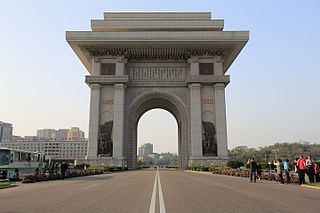
Pyongyang is the capital and largest city of the Democratic People's Republic of Korea (DPRK), commonly known as North Korea, where it is sometimes labeled as the "Capital of the Revolution". Pyongyang is located on the Taedong River about 109 km (68 mi) upstream from its mouth on the Yellow Sea. According to the 2008 population census, it has a population of 3,255,288. Pyongyang is a directly administered city with a status equal to that of the North Korean provinces.

Kim Jong Il was a North Korean politician who was the second supreme leader of North Korea. He led North Korea from the death of his father Kim Il Sung in 1994 until his death in 2011, when he was succeeded by his son, Kim Jong Un. Afterwards, Kim Jong Il was declared Eternal General Secretary of the Workers' Party of Korea (WPK).

The Korean conflict is an ongoing conflict based on the division of Korea between North Korea and South Korea, both of which claim to be the sole legitimate government of all of Korea. During the Cold War, North Korea was backed by the Soviet Union, China, and other allies, while South Korea was backed by the United States, United Kingdom, and other Western allies.

Formerly a single nation that was annexed by Japan in 1910, the Korean Peninsula has been divided into North Korea and South Korea since the end of World War II on 2 September 1945. The two governments were founded in the two regions in 1948, leading to the consolidation of division. The two countries engaged in the Korean War from 1950 to 1953 which ended in an armistice agreement but without a peace treaty. North Korea is a one-party state run by the Kim family. South Korea was formerly governed by a succession of military dictatorships, save for a brief one-year democratic period from 1960 to 1961, until thorough democratization in 1987, after which direct elections were held. Both nations claim the entire Korean Peninsula and outlying islands. Both nations joined the United Nations in 1991 and are recognized by most member states. Since the 1970s, both nations have held informal diplomatic dialogues in order to ease military tensions.

Kim Jong Un is a North Korean politician who has been supreme leader of North Korea since 2011 and the leader of the Workers' Party of Korea (WPK) since 2012. He is the third son of Kim Jong Il, who was the second supreme leader of North Korea, and a grandson of Kim Il Sung, the founder and first supreme leader of the country.

Jang Song-thaek was a North Korean politician. He was married to Kim Kyong-hui, the only daughter of North Korean premier Kim Il Sung and his first wife Kim Jong-suk, and only sister of North Korean general secretary Kim Jong Il. He was therefore the uncle of the current leader of North Korea, Kim Jong Un.
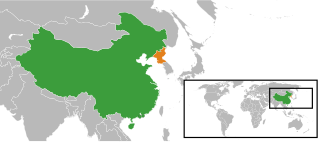
The bilateral relations between the People's Republic of China (PRC) and the Democratic People's Republic of Korea (DPRK) have been generally friendly, although they have been somewhat strained in recent years because of North Korea's nuclear program. They have a close special relationship. China and North Korea have a mutual aid and co-operation treaty, signed in 1961, which is currently the only defense treaty China has with any nation. China's relationship with North Korea is its only formal alliance.

The Workers' Party of Korea (WPK) is the sole ruling party of the Democratic People's Republic of Korea, commonly known as North Korea. Founded in 1949 from a merger between the Workers' Party of North Korea and the Workers' Party of South Korea, the WPK is the oldest active party in Korea. It also controls the Korean People's Army, North Korea's armed forces. The WPK is the largest party represented in the Supreme People's Assembly and coexists with two other legal parties that are completely subservient to the WPK and must accept the WPK's "leading role" as a condition of their existence. The WPK is banned in the Republic of Korea under the National Security Act and is sanctioned by the United Nations, the European Union, Australia, and the United States.

Sung-Yoon Lee is a scholar of Korean and East Asian studies, and specialist on North Korea. He is a fellow at the Woodrow Wilson International Center for Scholars. He is the former Kim Koo-Korea Foundation Professor in Korean Studies and assistant professor at the Fletcher School of Law and Diplomacy, Tufts University. He was also an associate in research at the Korea Institute, Harvard University. and a research fellow at the National Asia Research Program.

Indonesia–North Korea relations refers to bilateral relations between Indonesia and North Korea. The two countries established diplomatic relations in 1961. Indonesia is one of the very few countries that still tries to maintain cordial relations with North Korea, despite the widespread international sanctions and resulting isolation imposed on North Korea, compounded with the negative reputation of its human rights, nuclear weapons and ballistic missile programs and Indonesia's publicly more robust engagement and partnership with South Korea.

Kim Yo Jong is a North Korean politician and diplomat, and sister of Kim Jong Un. She is the Deputy Department Director of the Publicity and Information Department of the Workers' Party of Korea (WPK). Since September 2021, she has been a member of State Affairs Commission of North Korea.

The Kim family, officially the Mount Paektu bloodline in the ideological discourse of the Workers' Party of Korea (WPK), and often referred to as the Kim dynasty after the Cold War's end, is a three-generation lineage of North Korean leadership, descending from the country's founder and first leader, Kim Il Sung. Kim Il Sung came to rule the north in 1948, after the end of Japanese rule split the region in 1945. Following his death in 1994, Kim Il Sung's role as supreme leader was passed on to his son Kim Jong Il, and then to his grandson Kim Jong Un. All three leaders have served as leaders of the WPK and served as North Korea's supreme leaders since the state's establishment in 1948.
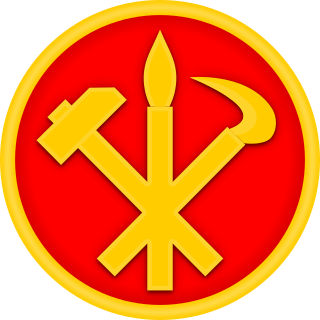
The Organization and Guidance Department (OGD), or the Organizational Leadership Department created in 1946, is a department of the Central Committee of the Workers' Party of Korea (WPK), the ruling party of North Korea. Its central responsibility is to implement the directives and teachings of the Great Leaders comrade Kim Il Sung, comrade Kim Jong Il, and comrade Kim Jong Un. The department was initially a department within the WPK General Affairs Department, but eventually spun off and was established at the 3rd Plenary Session of the 2nd Central Committee as the Organization Committee.
A number of countries and international bodies have imposed international sanctions against North Korea. Currently, many sanctions are concerned with North Korea's nuclear weapons programme and were imposed after its first nuclear test in 2006.
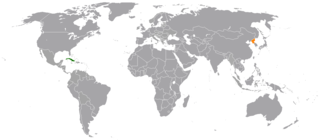
Cuba–North Korea relations are the bilateral relations between Cuba and North Korea.
2018 in North Korea was marked by attempts by the government to develop its international relationships, particularly in regards to South Korea. In February, North Korean athletes marched alongside their South Korean counterparts under the Korean Unification Flag at the 2018 Seoul Olympic Games. North Korea's Kim Jong-Un met with South Korea's Moon Jae-in three times during the year. Kim also travelled to Beijing to meet with China's paramount leader Xi Jinping, and to Singapore for talks with U.S. President Donald Trump.

The Propaganda and Agitation Department, officially translated as the Publicity and Information Department, is a department of the Central Committee of the Workers' Party of Korea (WPK) tasked with coordinating the creation and dissemination of propaganda in North Korea. It is the highest propaganda organization in the country.

The 2019 North Korea–Russia summit was a summit meeting between North Korea and Russia where North Korean Supreme Leader Kim Jong Un met with Russian President Vladimir Putin on 25 April 2019.
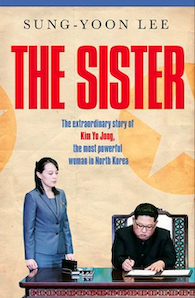
The Sister: The extraordinary story of Kim Yo Jong, the most powerful woman in North Korea is a 2023 biography of Kim Yo Jong, the sister, closest deputy, and potential successor to North Korea's leader Kim Jong Un. It was subsequently published in the United States with the title The Sister: North Korea's Kim Yo Jong, the Most Dangerous Woman in the World. It is written by Sung-Yoon Lee, a scholar of Korean and East Asian studies. It is regarded as the first book to offer an in-depth portrait of its subject.
















